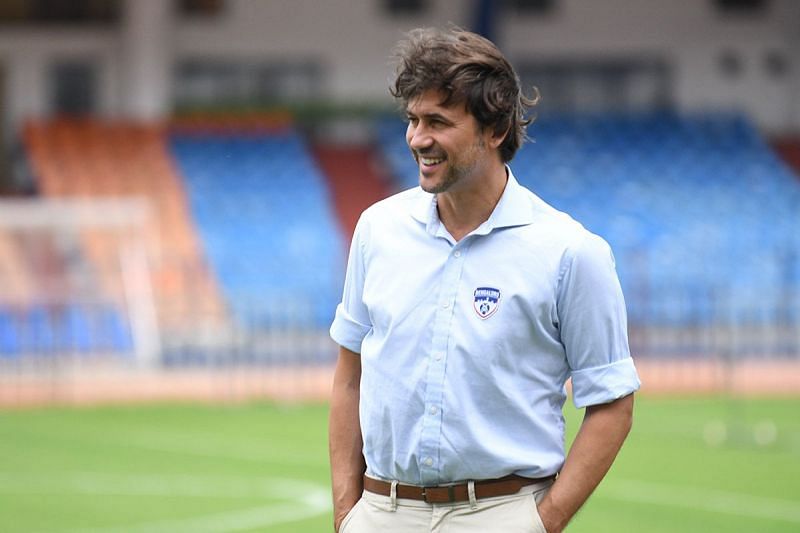
“If the circumstances and timing are right, I could return to India” – Former Bengaluru FC coach Carles Cuadrat on potential ISL comeback
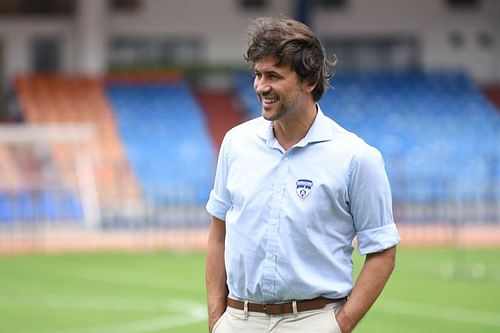
Carles Cuadrat has had a storied coaching career in India. He has been an integral figure in Bengaluru FC’s brief history, winning one Federation Cup, one Super Cup and one Indian Super League title each with the Blues between 2016 and 2021. He was also part of the BFC squad that became the first Indian side to reach the AFC Cup final in 2016.
Having joined BFC as Albert Roca’s assistant in 2016, Cuadrat was handed the reins of the side at the end of the 2017-18 season. In his very first season as BFC head coach, he led the club to their maiden Indian Super League title and established his credentials in India’s top-tier league. Under his stewardship, BFC became the first ISL team to top the regular league as well as clinch the trophy.
He nearly replicated his success the following season as BFC reached the playoffs for the third year in a row.
Cuadrat’s foray into coaching began with Turkish giants Galatasaray in 2009, where he was part of Dutch legend and former Barcelona manager Frank Rijkaard’s technical staff. Thereafter, the Spaniard has grown from strength to strength with stints at the Saudi Arabia and El Salvador national teams under his belt.
Much to his credit, Cuadrat managed some of Indian football’s biggest names whilst at BFC during those four-and-a-half years. Fans began identifying him with the club, and he helped the team reinforce its status as one of Indian football’s most professional and well-managed outfits. His legacy is also significant as many young Indian players like Rahul Bheke, Nishu Kumar and Suresh Singh Wangjam blossomed under his guidance and earned national team call-ups.
However, all good things come to an end, and this was no exception either. In January 2021, Cuadrat was relieved of his duties as BFC issued a Press release citing a “departure” from the club’s “philosophy”. Despite appointing Naushad Moosa as interim coach for the remainder of the previous season and Germany’s Marco Pezzaiuoli as the new head coach, BFC have continued to struggle, managing to win only three of their last 18 ISL fixtures.
Cuadrat, meanwhile, is serving as the assistant coach of Cyprus’ first division club Aris Limassol, who are currently placed third in the Cypriot Championship.
How is Indian football different from Cypriot football? Why are BFC struggling so much of late? Has he been approached by any ISL team, and does he harbor aspirations of returning to India? How can FC Barcelona arrest their downslide and stage a turnaround?
Sportskeeda recently caught up with Cuadrat for an exclusive chat, and sought answers to these questions by delving deep into his philosophy.
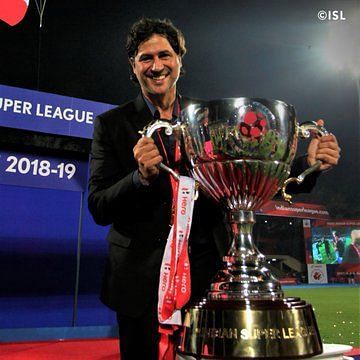
Q: Aris Limassol are doing well in the Cypriot First Division. How would you rate the standard of Cypriot football in comparison with Indian football?
Thanks a lot. You're right. Aris is a recently promoted team from the 2nd League, but since the beginning of the season we have been fighting for the top positions. We're actually ranked ahead of big budget and historic teams like Apoel, Omonia and Anorthosis. I am very happy with the experience because it allows me to know a new market, and increase my experience and knowledge about football in general and meet new players and coaches.
In comparison with Indian football, there are notable differences. Perhaps the most significant is that players come to this country after interesting professional careers in major leagues, so there are far fewer individual mistakes when deciding tactically than in Indian football. We are seeing very bulky results in the 8th edition of the ISL - matches ending with 4-2 or 6-4 scorelines. Here in Cyprus, that does not happen. Few errors occur and the results are more of the 1-0 or 2-1 type. Another big difference is that in training you don’t have to repeat the instructions much. The players understand everything very quickly. They have been in very demanding teams for many years.
On the other hand, in India, sometimes you get players who suddenly go from amateur football to ISL professional, and that change is very big. It takes time. In Cyprus, you can play with 11 starting players not born in Cyprus. So the league is not so interested in promoting local footballers, but rather in competing well and bringing many teams to UEFA tournaments. The current ranking of the country allows 5 clubs to play in European competitions, and that is a very big prize for such a small country. That is why they sign and sign, so as not to lose that opportunity.
Q: You spent five glorious years at Bengaluru FC and established yourself as one of India's best coaches during that period. You admitted in your previous interviews that your philosophy did not match with that of the club in your last season in India. Do you rue not getting more confidence/support from the management and the players?
The players and the club gave me all the support. Of that I never had any doubt. Together we became champions in 2017, 2018 and 2019 (two Cups and a ISL Trophy). We still keep in touch with some players and people from the club, and I know they are great professionals and did their best to get results. What happened then was that the club's vision was to start a new project, even though we hadn't finished the first half of the league yet. We were just 1 point away from the playoffs and I'm convinced the team had big chances to reach their fourth consecutive ISL semi-final. We had a core of winning players, who knew the country and the competition very well. With Gurpreet [Singh Sandhu], Juanan, Erik [Paartalu], Dimas [Delgado], [Rahul] Bheke, [Harmanjot] Khabra, Ashique [Kuruniyan], Suresh [Wangjam], Sunil [Chhetri], Cleiton [Silva] and Udanta [Singh], I think we had a very good base to compete for last season’s title. But the management decided to start working for the future and not for immediate results. That seems perfect to me, it is a strategic decision of the club that everyone has to respect. They decided to end the old winning era in the midst of Goa's competitive bubble, but obviously when you make a bet with the new youngsters and bench 2 or 3 foreigners, you don't get results overnight. You have to be patient. We see it very clearly now with FC Barcelona, the club that formed me. In any football ecosystem, you can transition slowly and still get results. We did that in ISL-6 by putting youngsters like Suresh and Ashique in the line-up and still reaching the semi-finals. But you don’t do it overnight; it's very difficult for youngsters without the best competitive experience to win high-demand matches. That's the main reason why we got 50% wins during my time as head coach and now the team is struggling with only 3 victories in the last 18 ISL games. We were very competitive as a team, we only used to lose 4 or 5 games per season at most. But since January, BFC have lost 9 of their 18 ISL games. The team was used to fighting for the top positions, and now it hurts to see them so low in the standings. But it is understandable, because it is a completely new team and each new project takes time. Players like Roshan [Singh], Parag [Shrivas] and Leon [Augustine], who made their ISL debuts under me, can be part of a competitive team for the future. But they all need time to become stronger in the top competition.
I sincerely hope that the team is built as soon as possible and that it can give joy to its fans, who are very faithful supporters and cheer on their team with all their soul.
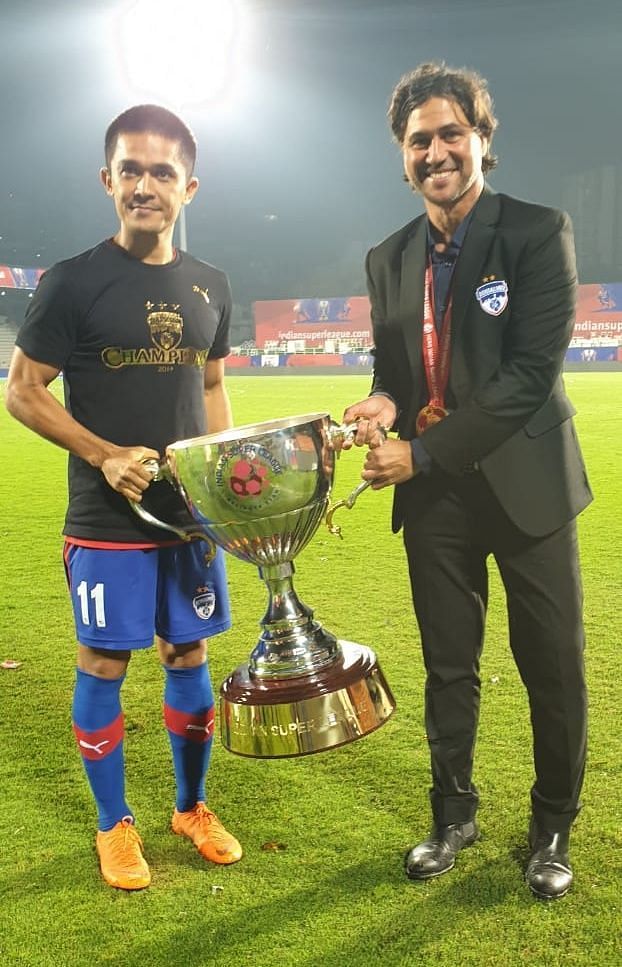
Q: What according to you has been ailing Bengaluru FC since the previous season?
I think that while the previous champions, such as Mumbai City or ATK Mohun Bagan have been reinforcing their squads year after year, at BFC, we have not brought in players who have improved on what we had. We had a champion team in 2019, and it was progressively diluted, while the rivals strengthened. To compete at the top, it is important to retain players who give identity to the team. We won the ISL in 2019 and immediately lost Miku and Xisco for the following season, two very important players in our attack. That and a poor recruitment of foreign forwards forced us to become even stronger in defense, and even then we reached the semi-finals in the 2019-20 season and created several ISL records in terms of clean sheets and least goals conceded. For ISL-7, we again let out players like Albert Serran and Nishu [Kumar] who made up that strong defense. I think that in general, year after year, the ISL teams have been reinforcing their squads with greater economic investment, while BFC have permitted important players to leave the club. Everyone can see that the team is getting weaker with each passing season. There are many players who belonged to the club and were allowed to move to other teams. Cases such as Bheke, Juanan, Edu García, Khabra, Nishu, Lenny Rodrigues, Subhasish Bose, Mandar Rao Desai or Len Doungel are having important roles in opponent squads. I fully understand the strategic sports policy of making young people play for the future. I come from FC Barcelona, a club that specializes in that. But perhaps those players behind are not ready to compete yet and need time to pay off. To fight for titles you need a good balance between experienced and young players, and in the history of the ISL we have never seen a team reach the finals without those veteran players, local and foreign, who give the team identity and competitiveness, as has happened with great teams such as the Goa of Mourtada Fall, Hugo Boumous and Ahmed Jahouh, all of whom featured in Mumbai City's champion team in the last edition, the ATK of Roy Khrisna and David Williams, or the Bengaluru of Miku, Dimas and Erik mixed with a good core of experienced Indian players like Sunil, Bheke and Khabra. BFC are in the process of building a new competitive squad and it will take some time.
Q: You achieved success in almost all major Indian domestic competitions. Has the ISL really made any palpable difference to Indian football, or is it just superficial? If it has made any difference, why is the national team struggling to win against relatively weaker nations like Bangladesh, Nepal, Sri Lanka and Afghanistan?
There is no question about the improvement that the ISL has brought to Indian football. The Indian players are now better professional athletes and take care of their habits much more compared to, say, five to eight years ago. Everything in the ISL is better than the standards of the I-League: better stadiums, better foreigners coming to the league, either as players or as coaches, better training sessions, bigger chances of reaching Asian competitions, with the agreement with AFC for the ISL winner to reach the Champions League group stage etc. The creation of the ISL was a great success, but it must be maintained over time as the Japan League1 (28 seasons already) or the Chinese Super League (17 seasons) in order to really bear fruit. As for the national team, I think a lot of time has been wasted testing players who will never have the level to compete against top players from Asia. It's a shame because knowing that you just have a few games per year - due to the Covid-19 pandemic, the international calendar, etc - what should have been done is to bet on a block and a system and work together as long as possible. We have to understand that the other countries in the area also sign good technicians and work on their defensive structures to be competitive. The differences are minimal in highly competitive football, and not beating Afghanistan, Sri Lanka or Bangladesh shows that one thing is to feel superior and have ball possession and another is to have enough quality to beat an organized defense.
Q: Can we expect to see Carles Cuadrat back in India soon? Without divulging the names, could you tell us how many ISL teams have approached you recently?
Now I am very happy with the Aris Limassol project in Cyprus. But in football you never know what will happen in the future. It is logical to think that after managing a team in 50 ISL matches and having been champion in 2019, some teams have shown interest in signing me. I know the competition, I know the country's players, I know what kind of foreign players perform well there and I got the results that support my work. But I have always said that I will not sign just to stay in business, but that I want to get involved in projects that I can be passionate about and where I see results can be achieved.
I came to Cyprus with an interesting project, and the team, founded in 1930, is having the best season in the first division in their entire history. This is how I want to move. I am a reserved and cautious professional, and you will understand that I will not tell you how many ISL teams have contacted me to return to India. But it is a fact that all the technicians with experience in the country have received new projects because the owners of the franchises know that a lot of time is saved and the money is better amortized when you hire someone who does not need an adaptation period and already knows the many difficult features of life and competition in India. The three coaches with the most ISL matches are: Steve Coppell (53 matches) Sergio Lobera (80 matches) and Antonio Lopez Habas (96 matches). And they all bet on a second and even a third project. So for me, after 50 matches in the ISL, I understand that if the circumstances and the timing are right, competing there again could be something interesting for me. Time will tell.
Q: Are you open to taking charge of a team like SC East Bengal which is struggling at the moment, but has a huge legacy and fanbase?
No comments
Q: If given an offer in the future, would you consider a reunion with Bengaluru FC?
No comments
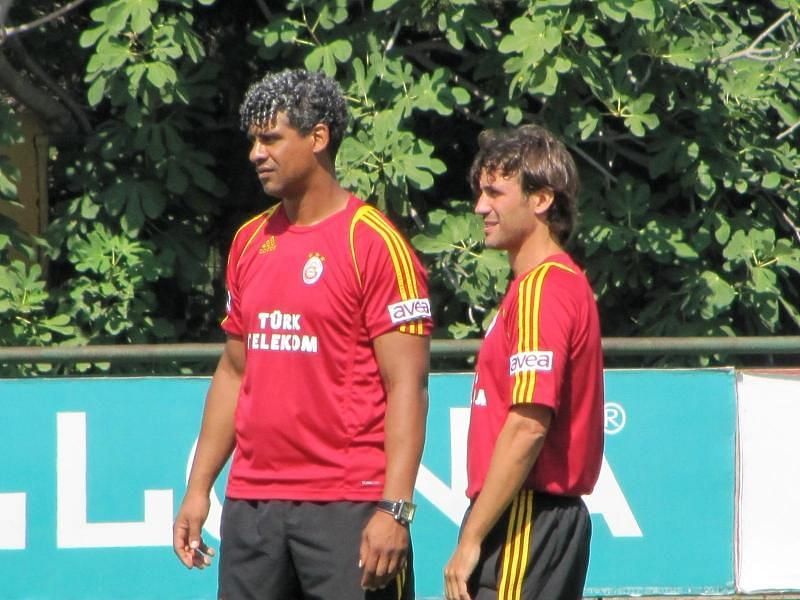
Q: Your heart must be with FC Barcelona. Fans have been dejected after seeing their beloved team’s relegation to the Europa League. What can FCB, under Xavi’s stewardship, do to make a quick turnaround?
Everyone could foresee that the times after Messi’s departure would be tough. What was more difficult to think was that the situation would be so desperate economically that you would also lose in a short time other players with more than 20 goals / season such as Griezmann or Luis Suarez. In the end, the quality in front of the goal makes the difference in the great teams, and that costs money. Who can score 20 goals now at Barça? No one. You can be the best coach in the world, and I think from what I know of him that Xavi is a very good coach, that to score goals at such a top level you need those decisive players who are great world stars. Barça are paying for their financial management mistakes, and it is very difficult to compete at the European level with inexperienced players like Gavi, Nico, Pedri, or Abde. Although they are very good players, Gavi or Nico had not even played in the Spanish first division until 5 months ago. They need to grow as players, and be accompanied by leaders who make adaptation easier for them. To give an example, it was relatively easy for Suresh to play in a midfield accompanied by Erik and Dimas. It brought him to the national team. But this season, without those two players, I see more problems in his game and worse decisions. It is normal. You always have to go into the future with the right steps. If you run too much with the youngsters, you run the risk of what is happening to Barça now. It will take a few years and powerful financial investments for Barça to be able to compete well in the Champions League again.
Check out the updated ISL point table here.
Rapid Fire Questions:-
Your most memorable match with BFC:
ISL-5 final against FC Goa in Mumbai. Bheke’s header off a corner kick gave us the trophy.
One young Indian forward who could be Sunil Chhetri's heir in the Indian team:
Players like Sunil Chhetri don't happen that often. The national team will have to find other ways to replace him because his performance for more than 15 years as a professional has been far above the normal standards of Indian football.
Suresh Singh Wangjam or Apuia – who has a better prospect for India?
Both of them are doing a brilliant job. They are compatible to play together in the national team. In addition, they show that good long-term planning can pay off, since both players came out of the work plan that the AIFF made for the U-17 team in preparation for the World Cup in India in 2017. A lot of good work was done with that group of players. They toured abroad, and their evolution is bringing interesting footballers to the ISL.
Which ISL head coach has impressed you the most so far this season?
My good friend Kiko Ramirez. The two of us played together at CE Sabadell of the Spanish 2nd division in the 90s. I am happy to see how he has shaped an interesting project with Odisha. It is a difficult challenge to catch a team with so many young people and with bad previous results. However, good recruitment and tactics have made them start the championship on a good note and are for the moment ahead of clubs like ATK Mohun Bagan, Goa and Bengaluru.